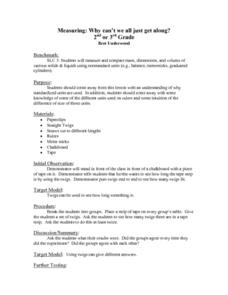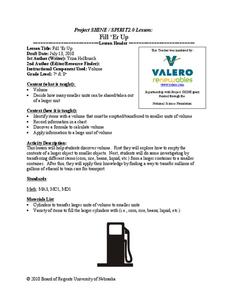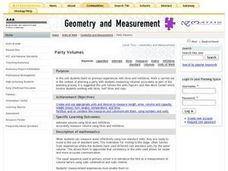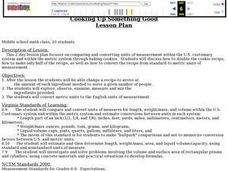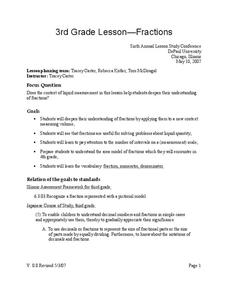Curated OER
Recipe Conversions-Enrichment Worksheet
A recipe for Chocolate Chewies, a no-bake cookie, is provided, but the ingredients are not written in useable amounts. Your cooking class must first convert them into useable amounts before preparing the treat. The final product acts as...
Curated OER
Heterogeneous Equilibrium: Measurement of a Partition Coefficient
In this chemistry worksheet, students examine a concept in science and then use the knowledge in application by conducting an experiment.
Teach Engineering
Capillarity – Measuring Surface Tension
How do cohesion and adhesion work together? The third installment of a nine-part series teaches young scientists the difference between adhesion and cohesion. They also learn how cohesion and adhesion work together to cause capillary...
Curated OER
Measuring: Why Can't We All Just Get Along?
Students examine why having standardized units of measurement is important. They investigate the use of non-standard measure, twigs, while measuring the piece of tape. Next, they experiment with straws, paper clips, and rulers before...
Curated OER
Oobleck
First graders explore Oobleck. They manipulate and observe the properties of Oobleck. Students discuss the differences between solids and liquids. They investigate Oobleck. Students write a sentence describing what they observed about...
Curated OER
Slosh, Dribble, and Plop
Students recognize the need for a standard unit of volume. They estimate and measure to the nearest liter. Also they relate the liter to the familiar everyday containers.
Curated OER
A Matter of Fact
Third graders define matter as anything that takes up space and has mass, recognize, through experimentation and observation, that matter exists in three forms, including solid, liquid, and gas, and discuss characteristics of each form...
Curated OER
Water and Ice
Students study the water cycle and the different forms of water. In this exploratory lesson plan students observe, measure and describe water as it changes state.
Curated OER
Fill 'Er Up
Students identify how many smaller units can be found in a later unit. In this geometry lesson, students calculate the volume and the transfer amount to a smaller unit. They solve real life problems using the formula for volume.
Curated OER
Unknown Liquids
Students must design and conduct an experiment to determine which unknown liquid has a greater density based on basic information about the liquids and containers. Students are given specific materials to work with.
Curated OER
Party Volumes: Measurement
Second graders explore liters and milliliters. They estimate volume and accurately measure the volume. Students plan a party and measure volume using liters and milliliters as part of the planning process.
Curated OER
Addendum to the Written Curriculum: Measuring Solids
Students use standard rulers to measure the length of common classroom items - such as pencils, books, desk tops - in inches and centimeters, and measure weight in pounds. They also answer math questions, such as "How long is the front...
Curated OER
Cooking Up Something Good
Students compare and convert units of measurement within the United States customary system and within the metric system by baking cookies. Students discuss how to double the cookie recipe, how to make only half of the recipe, and how to...
Baylor College
We Need Water
There's nothing quite like a glass of ice-cold, freshly squeezed lemonade. Lesson seven of this series explains how the water humans need to survive can come in many forms. Teach your class about how much water humans require every day...
Curated OER
Catch a Rainbow
Second graders listen to a book read to them entitled, WHAT MAKES A RAINBOW and recall and describe their five senses and what parts of their bodies use their five senses and then complete the Catch a Rainbow activity sheet using a...
Curated OER
Fractions
Students practice measurement. In this fractions instructional activity, 6th graders measure volume of a liquid, e.g. 1/5 liter, and learn the vocabulary of fractions (numerator, denominator). Students solve sample problems...
Curated OER
Mind Your P's and C's!
Second graders estimate how much volume a container can hold. In this math lesson, 2nd graders compare their estimates with actual measurements. They share and discuss their results in class.
Cornell University
Density
Certain things just do not mix, including liquids of varying densities. Learners collect data to determine the densities of several liquids. They then use the density information to predict the type of liquid.
Alabama Learning Exchange
Sky High
How are skyscrapers built? What does it take to make a structurally sound building? How can one work within a budget to complete a building project? These guiding questions will be investigated and answered within a hands-on lesson....
Alabama Learning Exchange
The Water Cycle
Learners identify the stages of the water cycle. They listen to the book "Magic School Bus: Wet All Over," examine the Build Your Own Water Cycle website, predict and measure the amount of water in a jar for a week, and read a short play...
Michigan State University
Gases Matter
Young scientists learn that seeing isn't necessarily believing when it comes to the states of matter. After performing a fun class demonstration that models the difference between solids, liquids, and gases, children complete a series of...
University of Colorado
Happy Landings: A Splash or a Splat?
Huygens spacecraft landed on Saturn's moon Titan in 2005, making it the farthest landing from Earth ever made by a spacecraft. In this hands-on activity, the 12th installment of 22, groups explore how density affects speed. To do this,...
Teach Engineering
Viscous Fluids
Elasticity and viscosity. Help your class understand the similarities and differences with an introduction to viscous fluids. After describing four types of fluid behaviors: shear thinning, shear thickening, Bringham plastic,...
LABScI
Viscosity: The Fluid Lab
There's more to fluids than meet the eye—they include gases, liquids, and polymers, too! Scholars complete three hands-on activities exploring different properties of fluids. They explore viscosity by measuring the resistance, or...



